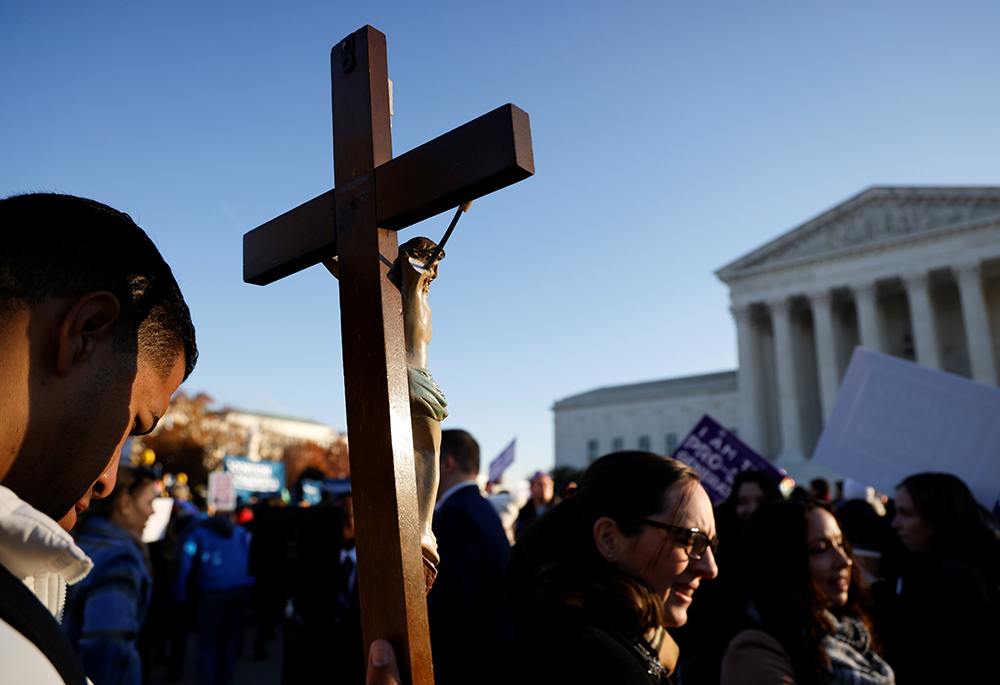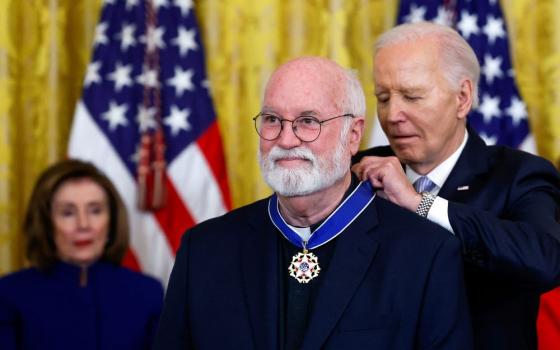
A pro-life activist holding a crucifix joins a protest outside the U.S. Supreme Court building Dec. 1, 2021, in Washington, ahead of the court hearing oral arguments in the case Dobbs v. Jackson Women's Health Organization, an appeal from Mississippi to keep its ban on abortions after 15 weeks of pregnancy. (CNS/Reuters/Jonathan Ernst)
Is bodily autonomy a genuine right? In the wake of the Supreme Court's decision to reverse Roe v. Wade, based on the argument that the Constitution was not intended to protect personal autonomy, it's a question Catholics need to ask. As Catholics, we do not believe the United States Constitution, nor any political document, dictates our rights. Rather, we look to natural law informed by revelation.
It is widely recognized among both conservative and progressive Catholics that the right to life is genuine, and not contingent upon legislative rulings. However, there seems to be less of a consensus, and not just among Supreme Court justices, about the right to bodily autonomy. One issue may be that people are not clear on what bodily autonomy is. Some are suspicious of the term because they associate it with radical individualism, or the kind of moral irresponsibility we saw from anti-vaccine advocates during the pandemic. Conservatives are often wary of the idea because they associate it with defenses of legalized abortion, or with sexual excess.
Bodily autonomy is, simply, self-ownership. It has to do with a human's right to make decisions about their own bodies without violence, coercion or systemic oppression. Violations of bodily autonomy include slavery, forced marriage, rape, forced sterilization and medical experimentation. These acts violate a person's dignity and rights even if they are not enforced through direct threats of violence or intimidation.
Humans have a right to make decisions about their bodies and be free from physical coercion. Regardless of how the U.S. Supreme Court interprets the Constitution, in Dobbs v. Jackson Women's Health Organization or elsewhere, bodily autonomy remains a fundamental, if limited, right on account of the nature of the human person. And one need not look to contemporary ideas from feminist thinkers to defend this right. One can look at the Catholic ethical tradition itself.
We understand a human's right to life in relation to the nature of the person. As Christians, we believe humans are made in the image of God and are good in ourselves, regardless of our utility, desirability, talents or even our moral character. A human life has nonnegotiable ethical value. Similarly, our right to bodily autonomy is connected to our imaging of the divine. Though we do not possess absolute freedom or perfect self-possession, still we reflect the absolute metaphysical self-sufficiency of God, in our capacity to rule over ourselves.
St. John Paul II understood the importance of autonomy in the life of the person. Writing as Karol Wojtyla in The Acting Person, he stressed that if we want to understand the real being or nature of the human person per se, we need to clarify what is meant by personal acting, as opposed to nonpersonal acting. In this, John Paul was simply following the Scholastic maxim that "action follows being" — that is, to understand a being's nature, watch how that being acts. It is an instruction in practical metaphysics.
So, what kind of acting is proper to persons? What kind of action reveals the person fully flourishing? To put it simply, personal action is autonomous action — action arising out of inner depth and freedom, not in response to stimuli or coercion. Even Thomas Aquinas understood this, writing in Summa Theologiae that "persons are not acted on, but act through themselves."
When persons are denied the right to act fully as persons, it may not be a violation as grave as a violation of the right to life, but it still does harm.
When persons are denied the right to act fully as persons, it may not be a violation as grave as a violation of the right to life, but it still does harm. Murder, abuse and torture are understood as violations of a person's fundamental rights, because they do verifiable harm. But we also recognize cases where fundamental natural rights are violated even when overt physical harm is not involved. An obvious instance of this is slavery. Even if an enslaved person is not being directly, physically harmed by the person enslaving them, being enslaved at all, being treated as an object, being denied agency, is contrary to their fundamental rights and dignity. Slavery is a violation of a human's basic rights as an autonomous individual. It entails treating a person as an object to be acted upon, rather than as a subject capable of acting out of their own inner depth and volition.
Understanding the person as an acting subject is one step toward recognizing the right to bodily autonomy. The next is understanding that humans, in our Christian philosophical anthropology, are not just disembodied intellects. We are embodied beings. Our bodies, contrary to what Plato suggested, are not prisons or containers for our personal minds. Our bodies are us. Therefore, personal autonomy does not refer simply to the freedom of the disembodied consciousness housed within a material organism. If we were to regard the human person this way, we would regard things done to a person's body as done only to their impersonal physical shell. But this view is false. What is done to one's body is done to that person.
Denying a person autonomy when it comes to decisions about their body violates human dignity because it violates the person's nature as an acting, embodied subject. A society that refuses to see bodily autonomy as real and deserving of protection is a breeding ground for abuse. Nonetheless, in the United States, too many remain reluctant to recognize it as a right. New York Times columnist Tish Harrison Warren recently wrote a piece referring to bodily autonomy as a "myth." Her argument rests on two claims: first, that bodily autonomy is "limited by our obligation not to harm others"; second, that bodily autonomy "denies the deep interdependence and limitations of every human body."
Warren is not the first to argue against bodily autonomy based on the idea that it is not an absolute right. It is a weak argument, however. That a right is limited does not mean that it is not real. Other rights that we recognize as real we also recognize as limited, including the right to property, and the right to self-defense. Some defenders of capital punishment even argue that the right to life is limited. That does not mean it is not real.
Advertisement
Obviously, our freedom to do what we like with our bodies is limited by our responsibility to respect the rights of others, according to Catholic social teaching on the common good. This was highlighted throughout the pandemic, when we saw that decisions to attend crowded events, decisions not to mask, decisions not to be vaccinated, have ethical implications for the larger community.
But restrictions on communal behavior, for the sake of the common good, do not violate personal autonomy per se. Asking a person who has been infected with a dangerous virus not to travel on a plane is not in the same moral category as forcibly vaccinating someone against their will — which is why our public health authorities did not do this.
Similarly, belief in bodily autonomy does not deny our interdependence or our limitations. We are not in danger of imagining we are gods, just because we recognize our own right to self-ownership. We know how powerless, how vulnerable, how mortal we are. We exist in a space of tension between this knowledge, and our belief in our own self-ownership, and irreducible moral worth.
The real danger we face is in the opposite direction. For most of our history in the United States and much of the western world we have failed to recognize and protect bodily autonomy. Our Christian nations have committed genocide, enslaved persons, experimented on the disabled, punished LGBTQ people and denied women agency over our bodies. In recent decades we have come closer to understanding that society must protect bodily autonomy if it is to be healthy. We have also come closer to having a reckoning regarding our many atrocious failures in this regard.
Now, when even a New York Times columnist who is an ordained Anglican woman priest casts doubt on the validity of bodily autonomy, we seem to be reverting to the worst of our past, expanding on the worst of our present. We are dredging up a deadly philosophical worldview in which some persons are denied self-ownership and autonomy, and treated instead like objects, like possessions.
Recognizing bodily autonomy as a legitimate good comes with various ethical and legislative challenges, and how we legislate about abortion is certainly one of them. It means that in our public life we will be faced with complex situations that are not always easy to resolve and may have no perfect solution. But the fact that our political and moral life is complicated is no reason to jettison the notion of bodily autonomy. Rather, we need to take seriously our responsibility to craft a culture in which all rights are protected, in the context of care for the common good.
What this looks like in practice is a discussion we need to have — but we can't have it with people who view bodily autonomy as just a myth.











